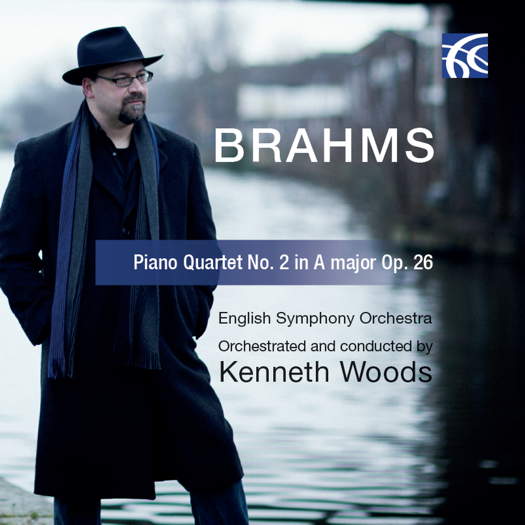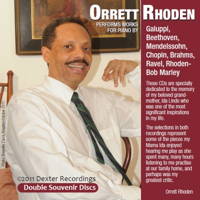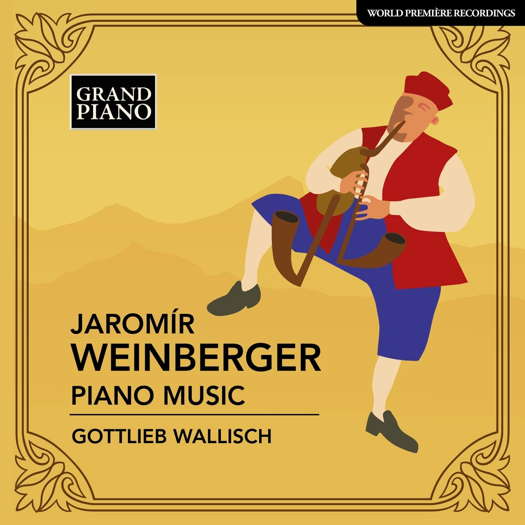 SPONSORED: CD Spotlight. A Very Joyous Disc - Brahms arranged by Kenneth Woods impresses Alice McVeigh.
SPONSORED: CD Spotlight. A Very Joyous Disc - Brahms arranged by Kenneth Woods impresses Alice McVeigh.
All sponsored features >>
 DISCUSSION: John Dante Prevedini leads a discussion about Composers, individuals or collective?, including contributions from David Arditti, Halida Dinova, Robert McCarney and Jane Stanley.
DISCUSSION: John Dante Prevedini leads a discussion about Composers, individuals or collective?, including contributions from David Arditti, Halida Dinova, Robert McCarney and Jane Stanley.
 SPONSORED: CD Spotlight. Most Remarkable - Jamaican pianist Orrett Rhoden, heard by Bill Newman.
SPONSORED: CD Spotlight. Most Remarkable - Jamaican pianist Orrett Rhoden, heard by Bill Newman.
All sponsored features >>

Innate Musical Talent
ROBERT McCARNEY listens to Weinberger piano music
'... the playing by Gottlieb Wallisch and the recorded sound on this CD are excellent throughout ...'
Before I listened to this CD I had known next to nothing about composer Jaromír Weinberger and my only acquaintance with his music had been a few excerpts from his blockbuster opera of the 1920s: Švanda Dudák (Schwanda The Bagpiper) which by now were very vague memories. So I was curious to hear his piano music and as always when listening to a composer one has almost never heard before hopeful of discovering something worthwhile or better.
Weinberger was a Czech composer more or less contemporary with Martinů. He showed unsuspected precocious musical ability when a piano, which was gifted by an aunt departing for the USA, was brought into the family home, his father, a used furniture seller, not having anywhere else to keep it. So rapid was his progress that Jaromír as a teenager was deemed worthy enough to head off to Leipzig to study with Max Reger; lessons which Weinberger was obliged to give up when Reger's abused heart fatally gave up on him in 1916.
Listening to this CD one is not surprised when one learns that Weinberger studied with Reger, especially when repeatedly exposed to his penchant and clear talent for fugues and fugal writing. What does surprise is his fondness for and seeming ease in music that has a clear debt to French Impressionism. One could say the same about Martinů but he spent a long period in France which is not the case with Weinberger. His ability to merge these two sources, let's say the Regerian rigour with the Ravelian rhapsodising is maybe his greatest achievement, at least as far as his piano music is concerned.
Listen — Weinberger: Allegro passionato (Piano Sonata No 2 in D minor)
(GP887 track 2, 1:20-2:06) ℗ 2022 HNH International Ltd :
This excerpt comes from the opening movement of his second Piano Sonata, which like the third was written when Weinberger was still - barely believably - a teenager. Such precocity only increases one's admiration for his innate musical talent. The impressionism to which he was clearly enamoured seems to have been as much Spanish as French, as on this CD alone there is a fine and aptly titled Sarabande and a Pavane inspired by the object of Don Quixote's chivalrous affection: Dulcinea.
Listen — Weinberger: Pavane pour Dulcinea de Toboso
(GP887 track 8, 0:00-0:54) ℗ 2022 HNH International Ltd :
My favourite example of Weinberger's natural compositional talent on this CD is a tiny piece called Mi-La-Do which he composed on the spot at a Christmas party in 1924. The A minor triad in the right hand is mirrored by a retrograde three note figure in the left hand. It's over before you know it, but I find it a little gem. I also find it very poignant in that both it and the circumstances of its creation paint a vivid portrait of the central European world; a multi-ethnic, multilingual, multi-faith world where there was an everyday hunger for high culture and the new, where music was a central part of that culture, a world in which Weinberger was formed and thrived and one that the Nazis ultimately utterly obliterated forever - an empty silent hole that resides where the heart of Europe used to beat.
Weinberger being Jewish - or at least Jewish as far as the Nazis were concerned; just like all bigots the Nazis never cared or cared to find out how the people they labelled degenerates chose or not to define themselves – suffered the all too familiar fate that befell all those who fell foul of Nazi dogma. Familiar as this sorry story may seem, its horror never becomes any more credible or palatable, nor should it. Just before the Anschluss he made his escape from Austria, from where via France, England and Canada he finally made his circuitous route to the safety and security of the USA where he had spent some time previously and where thanks to the success of Schwanda the Bagpiper he could expect doors opened to him.
However, whereas many European immigrants made a life for themselves in the USA, indeed in many cases lives much better than the ones they had left behind in the Old World, sadly this was not the case for everyone who went west and crossed the Atlantic. Weinberger, having been ripped out of the world he knew and loved, lived in the USA in a state of, what I have elsewhere read referred to as, echolessness. He never really adapted. Indeed it seems nostalgia gnawed away at him emotionally and physically until he was ultimately diagnosed with brain cancer. Rather than wait and succumb to the inevitable, he hastened his own end thanks to an overdose of barbiturates at the age of seventy-one. His wife died less than a year later.
Even the slightest reflection on the world that Weinberger was forced to abandon is enough to make one realise how hard it must have been for him to live and fit in anywhere else. This was the Prague of Franz Kafka. Indeed the man who translated Švanda Dudák into German – which precipitated the real start of its enormous success - was none other than Max Brod. Weinberger spoke five languages and was a voracious reader. The range of his interests and knowledge is only hinted at by the five Preludes and Fugues he wrote in 1923 that bear the title Rytiny; engravings in Czech. These are all mini-portraits of figures from Czech history. The last contains an unmistakable hint – I have no idea if intentional or not - of Schubert's Der Leiermann.
Listen — Weinberger: Prelude No 5 (Rytiny)
(GP887 track 14, 1:30-2:25) ℗ 2022 HNH International Ltd :
In a life which entailed so much sadness and suffering, the CD ends with sounds of the good times, namely three pieces from Schwanda the Bagpiper. This opera was based on a play written by Josef Kajetán Tyl, the man who wrote the words for the current national anthem of the Czech Republic. By opera standards it is quite a yarn but does not reach the heights of absurdity and incredulity of many such tales and it contains the great character of Babinský, who is a bigger cheat even than the Devil. It hardly need be said that it contains no end of Bohemian dance music which played no small part in its runaway success.
Listen — Weinberger, arranged by Gustav Blasser: Polka (Schwanda, the Bagpiper)
(GP887 track 18, 1:31-2:07) ℗ 2022 HNH International Ltd :
So did I discover anything worthwhile on this CD? Maybe - it's too early to tell. I certainly enjoyed it, although right here and now I don't know if that enjoyment will be enough to lead to many more further listenings. One thing is sure however and that is that the playing by Gottlieb Wallisch and the recorded sound on this CD are excellent throughout, likewise the notes are well-written and very informative. If you like to hear new things and especially of the piano variety, give it a go.
Copyright © 21 November 2022
Robert McCarney,
León, Spain

CD INFORMATION: JAROMIR WEINBERGER PIANO MUSIC


